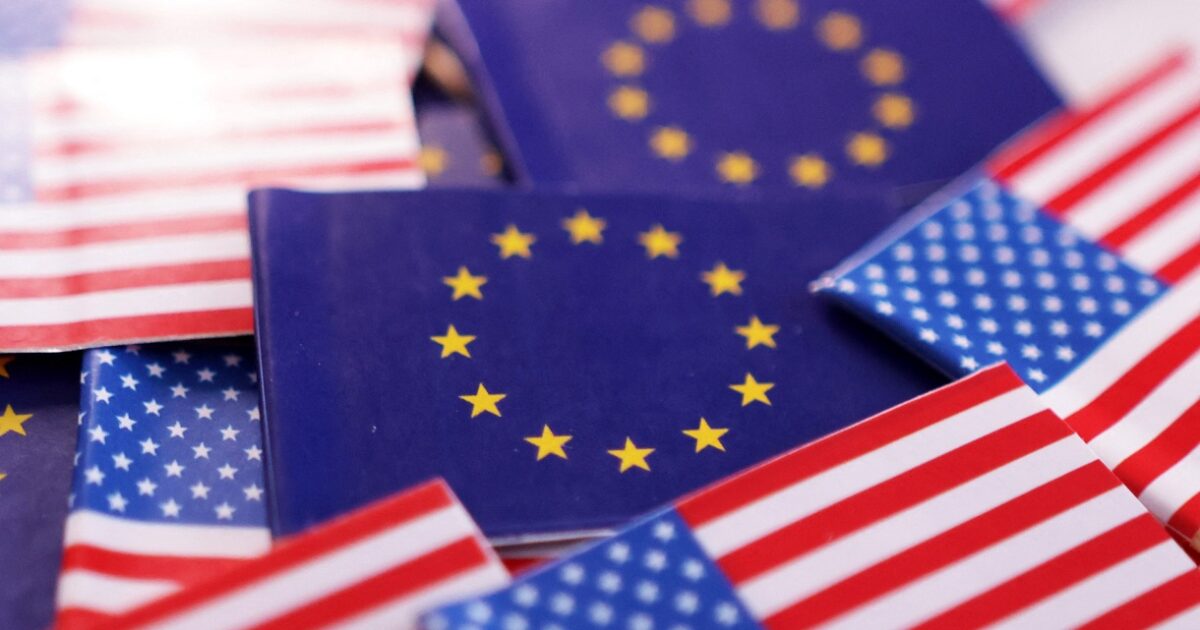Giant risks to global health can cause any tariff war USA – Eu, as this would possibly bring drug deficiencies.
The hot potential consequences if such a scenario was verified (ie US tariff warfare) were more noticeable after its leakage letter sent by European pharmaceutical giants to the EUthreatening it by leaving the Old Epirus, if not taken.
Without them, “in three months from today, scheduled investments of 16.5 billion euros could be transferred outside Europe,” warned NOVO Nordisk, Pfizer, Eli Lilly, Roche, Sanofi, Merck, GSK and Servier.
On the occasion of the coalition agreement between CDU – CSU and SPD, the Managing Director of the German Pharmaceutical Association (BPI), Dr. Kai Joachimsen (Kai Joachimsen) highlights how important it is at this period “Strengthen the industrial sector of health care in Germany – not only for economic reasons, but mainly for” health policy “reasons.”
US President Donald Trump is plunging the world, stock markets and financial markets in chaos: the special duties it announced had just come into force before it was suspended again, at least in part. Existing situation: He wants to grant many countries a 90 -day break – or time for negotiations.
However, a 10% reduced tax rate (with the exception of China) still holds, while 25% remain for cars, steel and aluminum.
A few days ago, the Kiel Institute for the World Economy (IFW) used computational models to analyze the economic consequences that US duties could have worldwide. “Duties will be a pressure test for some German and European sectors and companies for which the US is an important market,” says Julian Hinz, IFW trade policy director. After all, however, the trade policy of Donald Trump’s government is likely to harm the US itself. According to IFW, the consequences for the US will be “much more dramatic than for almost all other countries”.
US tariff duties: consequences for health care
A trade conflict is not just about the economy: in the end, it affects people – for example in their health care.
Medicines – unlike medical devices or some intermediate products, for example – have so far been excluded from Trump’s tariff measures. But this could be just a matter of time until it changes. Reuters news agency said a US government spokesman said Trump is planning further duties on products such as pharmaceuticals. Oliver Kirst, President of the German Union of Pharmaceutical Industry (BPI), believes: “The safety of medical supply should not be pawn in geopolitical conflicts. Commercial barriers, such as punitive duties, damage all involved – companies, healthcare systems and, ultimately, patients are the ones who suffer the most. “
The US is Germany’s most important export and import partner in the pharmaceutical sector, as shown by the BPI Pharma Data 2024.
“23% of total German pharmaceutical exports worth about 26 billion euros was directed to the US in 2023. Conversely, Germany introduced 74 billion euros of medicinal products, of which € 12.4 billion (17%) came from the US.” As a consequence of a trade war, German pharmaceutical exports to the US could “collapse up to 35% – with possible consequences for production, employment and research in Germany,” BPI explains with a reference to the IFO Institute.
Kirst stresses that “the problems are complicated: duties not only make imports more expensive and therefore access to the US market, but also burden the US health system itself. They increase costs and have an impact on the financial accessibility of treatments ” – at the expense of patients. BPI also points out Europe’s ‘critical dependence’, especially in the field of blood plasma supply, which requires US imports to meet demand.
European Pharmaceutical Industry: Risk of Exit?
European pharmaceutical companies They had warned the European Commission that pharmaceutical research, development and production could be transferred to the US if Europe does not act quickly and decisively.
A survey between 18 large and medium-sized companies of the European EFPIA pharmaceutical federation has shown that 85% of investment costs (about 50.6 billion euros) and 50% of research expenditure (about 52.6 billion euros) in the EU by 2029 are in the air.
Before Trump announces the cessation of duties, EU countries had already decided first duty countermeasures on US products. Subsequently, the President of the European Commission, Ursula von der Layen, now welcomed the temporary suspension of some US duties. “The European Union continues to support constructive negotiations with the United States, with the aim of achieving smooth and mutually beneficial trade.” At the same time, the EU will focus on commercial partnerships with countries sharing our commitment to free and open exchange of goods, services and ideas.
Germany: Strengthening the pharmaceutical, logistics and innovative sector
“We understand current developments as a call for politics, to review addictions and to reinforce the pharmaceutical sector in Europe. Our industry is based on stable, global supply chains, “BPI President Kirst. “What is decisive now is a decisive industrial and local policy. Our businesses need security security. In addition, we must enhance our strategic autonomy in all directions – in terms of sales markets, sources of drug imports and commercial partners. Particularly in the field of healthcare, human protection must be a priority – not the tariff rate. “
Against the release of the CDU – CSU and SPD program coalition agreement, the BPI praises the fact that the text “touches a wide range of issues related to health policy, research and industry”, which “can boost Germany as a place of innovation and services”.
The General Manager of BPI, Dr. Kai Joachimsen states that “especially in the light of US duties, we must make every effort to strengthen the industrial health economy in Germany – not only for economic reasons, but mainly for reasons related to providing care.”
